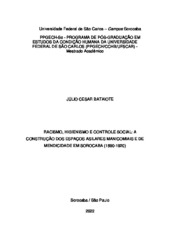Racismo, Higienismo e Controle Social: a construção dos espaços asilares manicomiais e de mendicidade em Sorocaba (1890-1920)
Abstract
The objective of this work is to discuss the exclusionary profile that has developed in the city of Sorocaba, together with the implementation and operation of three asylum institutions in the city. The period analyzed was from 1890 to 1920 and the institutions analyzed were: Asylo Succursal de Alienados de Sorocaba; the Asylo de Mendicidade São Vicente de Paulo and the Institute of Mental Hygiene “Dr. Luís Vergueiro” - Asylum of Sorocaba. The way these institutions operated were in tune with the eugenic, racist and exclusionary ideals spread around the world during the late 19th and early 20th centuries and which lasted in Brazil, as well as in other countries, for decades. In an attempt to build a city within Eurocentric urban and civilizing standards, from the last decade of the 19th century, the local elite sought status for the city of Hygienopolis Paulista. With that, it incorporated into its mentality and organization, exclusionary practices of social hygiene against people considered unfit to live in society; crazy men and women, vagabonds and alcoholics were the target of exclusion and imprisonment in asylums and in the begging asylum built in the city. In line with the eugenic discourse disseminated among the intellectual, scientific-medical layers and the Brazilian State, the political-bourgeois elite of Sorocaba committed itself to creating restrictive legal elements in order to corroborate the construction of institutions of reclusion and asylum in the city in the course of the 20th century. Observing this process, we use the concept of Whiteness, to point out how the permanence of practices and actions supported by codes of normality and white-Eurocentric standards made it possible to strengthen the structural racism evidenced in Brazilian society.
Collections
The following license files are associated with this item:

